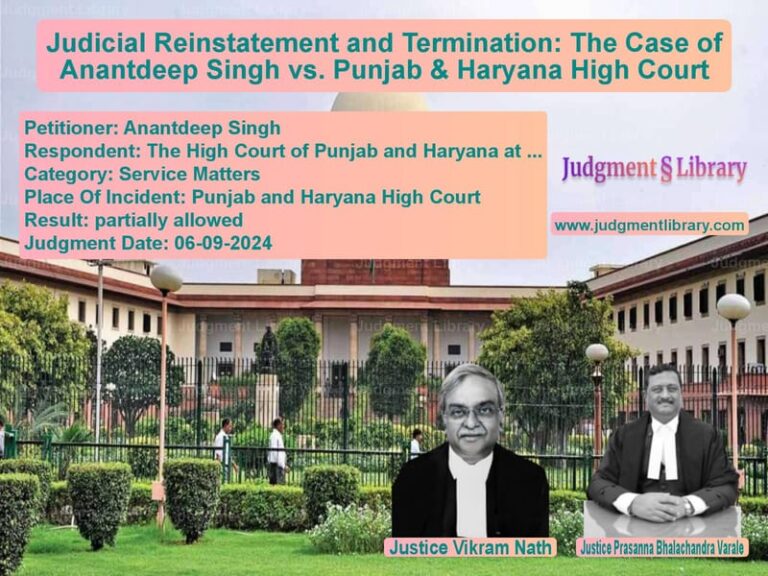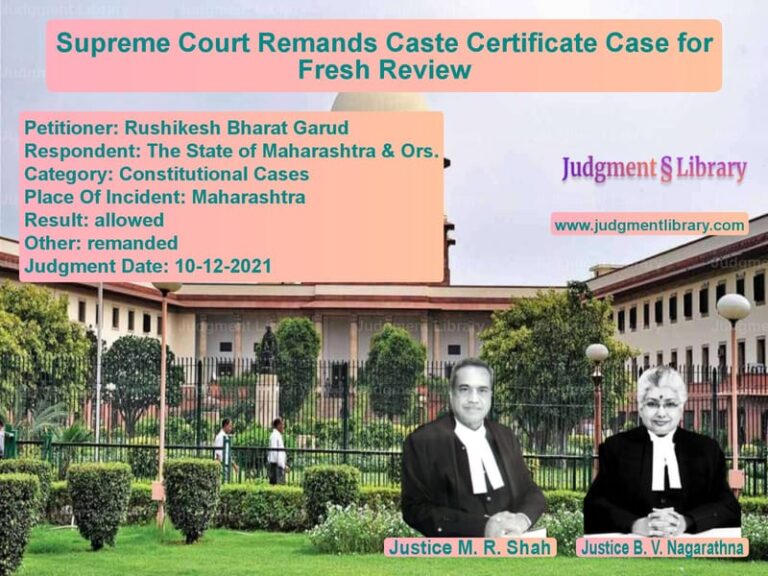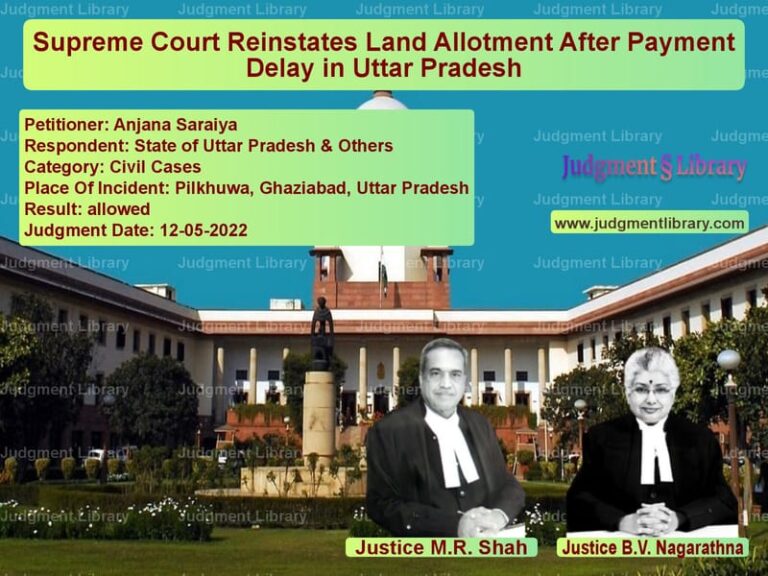SAFEMA Appeals and Limitation: Supreme Court Rejects Late Filing in Property Forfeiture Case
The case of Amina Bi Kaskar vs. Union of India & Others pertains to the applicability of limitation rules in filing appeals under the Smugglers and Foreign Exchange Manipulators (Forfeiture of Property) Act, 1976 (SAFEMA). The Supreme Court was tasked with deciding whether the delay in filing appeals before the Appellate Tribunal for Forfeited Property could be condoned beyond the prescribed 60-day limit.
The ruling clarifies the strict adherence to procedural timelines under SAFEMA, reaffirming that tribunals cannot extend deadlines beyond statutory limits. The judgment also highlights the importance of compliance with procedural laws in forfeiture cases related to properties allegedly acquired through unlawful means.
Background of the Case
The dispute arose when the Competent Authority under SAFEMA issued orders on July 14, 1998, and October 14, 1998, forfeiting certain properties belonging to the appellants. These properties were allegedly acquired through proceeds of smuggling and other illegal activities.
Under Section 12(4) of SAFEMA, any aggrieved party must file an appeal within 45 days of receiving the forfeiture order. A tribunal may condone a delay of up to 15 additional days (making a total of 60 days) if sufficient cause is shown. However, the appellants filed their appeals on October 20, 1998—the 81st day after receiving the forfeiture orders.
The Tribunal dismissed the appeals as time-barred, holding that it had no jurisdiction to condone delays beyond 60 days. The appellants challenged this before the Delhi High Court, which upheld the Tribunal’s decision. The case then reached the Supreme Court.
Key Legal Issues
- Whether the Appellate Tribunal under SAFEMA has jurisdiction to condone delays beyond the statutory limit of 60 days.
- Whether procedural lapses in the service of forfeiture orders affected the computation of limitation.
- Whether the appellants had a valid justification for filing appeals 81 days after receiving the forfeiture orders.
Arguments by the Appellants (Amina Bi Kaskar & Others)
- The appellants contended that the forfeiture orders were not properly served as required under Section 22 of SAFEMA.
- They claimed that delays in filing appeals were due to their illiteracy, lack of legal knowledge, and financial difficulties.
- They argued that their appeals should have been considered on merit, as forfeiture of property affects fundamental rights.
- They relied on previous judgments that emphasized the need for a liberal approach to condonation of delays in cases involving deprivation of property.
Arguments by the Respondents (Union of India & Others)
- The government asserted that the limitation period prescribed under SAFEMA was mandatory and could not be extended beyond 60 days.
- The respondents argued that the appellants had acknowledged receiving the orders on July 29 and 30, 1998, as evidenced in their appeal documents.
- They maintained that procedural deficiencies in serving the orders were irrelevant because the appellants had admitted knowledge of the forfeiture.
- The government cited past rulings to reinforce that statutory deadlines must be strictly followed, especially in financial and economic laws.
Supreme Court’s Observations
The Supreme Court made the following key observations:
- SAFEMA prescribes a strict 45-day limitation period for filing appeals, with a maximum extension of 15 additional days (totaling 60 days).
- The Tribunal had no jurisdiction to condone delays beyond 60 days, making the appeal filed on the 81st day legally untenable.
- The appellants’ admission that they received the orders on July 29 and 30, 1998, rendered their procedural objections immaterial.
- The court reaffirmed the principle that statutory limitations must be strictly adhered to, especially in cases involving economic offenses.
Final Judgment
The Supreme Court dismissed the appeals, affirming that:
- The Tribunal and the High Court were correct in rejecting the appeals as time-barred.
- SAFEMA’s limitation rules are mandatory and leave no room for further condonation beyond the prescribed 60-day period.
- The appellants’ procedural objections were irrelevant since they had acknowledged receiving the forfeiture orders.
- There was no justification for extending the deadline beyond the statutorily permissible limit.
Legal Significance of the Judgment
This ruling reinforces the importance of procedural compliance in cases involving economic offenses and forfeiture of property. The judgment establishes that:
- Statutory limitation periods must be strictly adhered to in financial and economic laws.
- Courts and tribunals cannot extend deadlines beyond what is explicitly permitted in the statute.
- Procedural objections related to service of orders become irrelevant once the party acknowledges receipt of the decision.
- SAFEMA’s provisions serve an important role in curbing illegal financial activities, and procedural delays cannot be used to circumvent forfeiture.
Impact on Future Cases
The Supreme Court’s decision sets a strong precedent for cases involving time-barred appeals under SAFEMA and similar financial laws. It underscores the need for vigilance in filing appeals within statutory deadlines and ensures that economic offenses are addressed without unnecessary procedural delays.
Petitioner Name: Amina Bi Kaskar & Others.Respondent Name: Union of India & Others.Judgment By: Justice R.K. Agrawal, Justice Abhay Manohar Sapre.Place Of Incident: New Delhi.Judgment Date: 20-04-2018.
Don’t miss out on the full details! Download the complete judgment in PDF format below and gain valuable insights instantly!
Download Judgment: Amina Bi Kaskar & Ot vs Union of India & Oth Supreme Court of India Judgment Dated 20-04-2018.pdf
Direct Downlaod Judgment: Direct downlaod this Judgment
See all petitions in Property Disputes
See all petitions in Legal Malpractice
See all petitions in Judgment by R K Agrawal
See all petitions in Judgment by Abhay Manohar Sapre
See all petitions in dismissed
See all petitions in supreme court of India judgments April 2018
See all petitions in 2018 judgments
See all posts in Civil Cases Category
See all allowed petitions in Civil Cases Category
See all Dismissed petitions in Civil Cases Category
See all partially allowed petitions in Civil Cases Category







